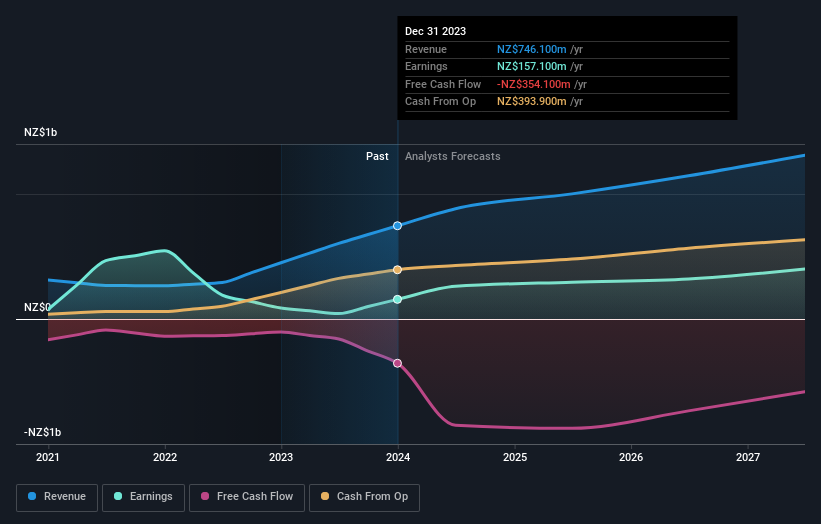- New Zealand
- /
- Infrastructure
- /
- NZSE:AIA
Auckland International Airport Limited's (NZSE:AIA) 3.7% loss last week hit both individual investors who own 46% as well as institutions

Key Insights
- Auckland International Airport's significant retail investors ownership suggests that the key decisions are influenced by shareholders from the larger public
- The top 25 shareholders own 50% of the company
- Institutional ownership in Auckland International Airport is 43%
To get a sense of who is truly in control of Auckland International Airport Limited (NZSE:AIA), it is important to understand the ownership structure of the business. The group holding the most number of shares in the company, around 46% to be precise, is retail investors. That is, the group stands to benefit the most if the stock rises (or lose the most if there is a downturn).
While institutions, who own 43% shares weren’t spared from last week’s NZ$429m market cap drop, retail investors as a group suffered the maximum losses
In the chart below, we zoom in on the different ownership groups of Auckland International Airport.
View our latest analysis for Auckland International Airport

What Does The Institutional Ownership Tell Us About Auckland International Airport?
Institutional investors commonly compare their own returns to the returns of a commonly followed index. So they generally do consider buying larger companies that are included in the relevant benchmark index.
Auckland International Airport already has institutions on the share registry. Indeed, they own a respectable stake in the company. This implies the analysts working for those institutions have looked at the stock and they like it. But just like anyone else, they could be wrong. When multiple institutions own a stock, there's always a risk that they are in a 'crowded trade'. When such a trade goes wrong, multiple parties may compete to sell stock fast. This risk is higher in a company without a history of growth. You can see Auckland International Airport's historic earnings and revenue below, but keep in mind there's always more to the story.

Auckland International Airport is not owned by hedge funds. Looking at our data, we can see that the largest shareholder is Auckland Council with 11% of shares outstanding. With 8.1% and 6.1% of the shares outstanding respectively, BlackRock, Inc. and JPMorgan Chase & Co, Private Banking and Investment Banking Investments are the second and third largest shareholders.
On studying our ownership data, we found that 25 of the top shareholders collectively own less than 50% of the share register, implying that no single individual has a majority interest.
Researching institutional ownership is a good way to gauge and filter a stock's expected performance. The same can be achieved by studying analyst sentiments. There are a reasonable number of analysts covering the stock, so it might be useful to find out their aggregate view on the future.
Insider Ownership Of Auckland International Airport
The definition of an insider can differ slightly between different countries, but members of the board of directors always count. The company management answer to the board and the latter should represent the interests of shareholders. Notably, sometimes top-level managers are on the board themselves.
Insider ownership is positive when it signals leadership are thinking like the true owners of the company. However, high insider ownership can also give immense power to a small group within the company. This can be negative in some circumstances.
Our most recent data indicates that insiders own less than 1% of Auckland International Airport Limited. Keep in mind that it's a big company, and the insiders own NZ$1.2m worth of shares. The absolute value might be more important than the proportional share. It is always good to see at least some insider ownership, but it might be worth checking if those insiders have been selling.
General Public Ownership
The general public-- including retail investors -- own 46% stake in the company, and hence can't easily be ignored. This size of ownership, while considerable, may not be enough to change company policy if the decision is not in sync with other large shareholders.
Next Steps:
I find it very interesting to look at who exactly owns a company. But to truly gain insight, we need to consider other information, too. Consider risks, for instance. Every company has them, and we've spotted 1 warning sign for Auckland International Airport you should know about.
If you are like me, you may want to think about whether this company will grow or shrink. Luckily, you can check this free report showing analyst forecasts for its future.
NB: Figures in this article are calculated using data from the last twelve months, which refer to the 12-month period ending on the last date of the month the financial statement is dated. This may not be consistent with full year annual report figures.
New: Manage All Your Stock Portfolios in One Place
We've created the ultimate portfolio companion for stock investors, and it's free.
• Connect an unlimited number of Portfolios and see your total in one currency
• Be alerted to new Warning Signs or Risks via email or mobile
• Track the Fair Value of your stocks
Have feedback on this article? Concerned about the content? Get in touch with us directly. Alternatively, email editorial-team (at) simplywallst.com.
This article by Simply Wall St is general in nature. We provide commentary based on historical data and analyst forecasts only using an unbiased methodology and our articles are not intended to be financial advice. It does not constitute a recommendation to buy or sell any stock, and does not take account of your objectives, or your financial situation. We aim to bring you long-term focused analysis driven by fundamental data. Note that our analysis may not factor in the latest price-sensitive company announcements or qualitative material. Simply Wall St has no position in any stocks mentioned.
Have feedback on this article? Concerned about the content? Get in touch with us directly. Alternatively, email editorial-team@simplywallst.com
About NZSE:AIA
Auckland International Airport
Provides airport facilities, supporting infrastructure, and aeronautical services in New Zealand.
Reasonable growth potential with mediocre balance sheet.

